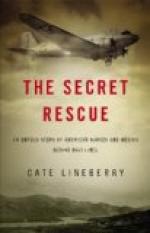There was a knock at the study door.
“Go ’way!” grunted Neil.
“Oh, come in,” called Paul Gale, without, however, removing his drowsy gaze from the ceiling or changing his position.
“I beg your pardon. I am looking for Mr. Gale, and—”
Paul dropped his legs over the side of the couch and sat up, blinking at the visitor. Neil followed his example. The caller was a carefully dressed man of about thirty-five, scarcely taller than Neil, but broader of shoulder. Paul recognized him, and, rising, shook hands.
“How do you do, Mr. Brill? Glad to see you. Sit down, won’t you? I guess we were both pretty nigh asleep when you knocked.”
“Small wonder,” responded the visitor affably. “After the work you did this afternoon you deserve sleep, and anything else you want.” He laid aside his coat and hat and sank into the chair which Paul proffered.
“By the way,” continued the latter, “I don’t think you’ve met my friend, Neil Fletcher. Neil, this is Mr. Brill, of Robinson; one of their coaches.” The two shook hands.
“I’m delighted to meet the hero—I should say one of the heroes—of the day,” said Mr. Brill. “That run was splendid; the way in which you two fellows got your speed up before you reached the line was worth coming over here to see, really it was.”
“Yes, Paul set a pretty good pace,” answered Neil.
The visitor discussed the day’s contest for a few minutes, during which Neil glanced uneasily from time to time at the clock, wondered what the visitor wanted there, and heartily wished he’d take himself off. But presently Mr. Brill got down to business.
“You know we’ve had a little victory in football ourselves this fall,” he was saying. “We won from Erskine by 17 to 6 last week, and we’re feeling rather stuck up over it.”
“Wait till next year,” said Neil to himself, “and you’ll get over it.”
“And that,” continued the coach, “brings me to the object of my call tonight. Frankly, we want you two fellows at Robinson College, and I’m here to see if we can’t have you.” He paused and smiled engagingly at the boys. Neil glanced surprisedly at Paul, who was thoughtfully examining the scars on his knuckles. “Don’t decide until I’ve explained matters more clearly,” went on the visitor. “Perhaps neither of you have been to Collegetown, but at least you know about where Robinson stands in the athletic world, and you know that as an institution of learning it is in the front rank of the smaller colleges; in fact, in certain lines it might dispute the place of honor with some of the big ones.
“To the fellow who wants a college where he can learn and where, at the same time, he can give some attention to athletics, Robinson’s bound to recommend itself. I mention this because you know as well as I do that there are colleges—I mention no names—where a born football player, such as either of you, would simply be lost; where he would be tied down by such stringent rules that he could never amount to anything on the gridiron. I don’t mean to say that at Robinson the faculty is lax regarding standing or attendance at lectures, but I do say that it holds common-sense views on the subject of college athletics, and does not hound a man to death simply because he happens to belong to the football eleven or the crew.




